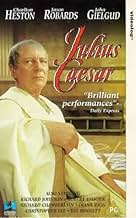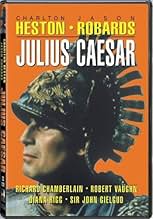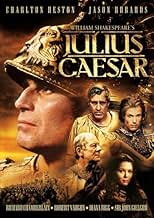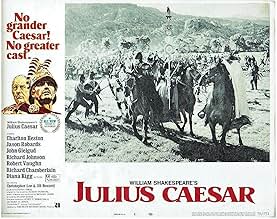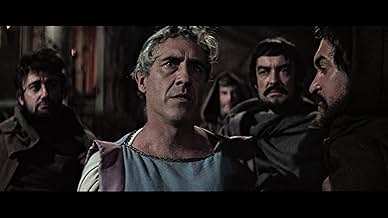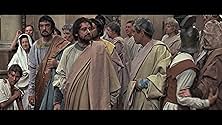Adicionar um enredo no seu idiomaThe growing ambition of Julius Caesar is a source of major concern to his close friend Brutus. Cassius persuades him to participate in his plot to assassinate Caesar, but they have both sore... Ler tudoThe growing ambition of Julius Caesar is a source of major concern to his close friend Brutus. Cassius persuades him to participate in his plot to assassinate Caesar, but they have both sorely underestimated Mark Antony.The growing ambition of Julius Caesar is a source of major concern to his close friend Brutus. Cassius persuades him to participate in his plot to assassinate Caesar, but they have both sorely underestimated Mark Antony.
- Direção
- Roteiristas
- Artistas
- Julius Caesar
- (as Sir John Gielgud)
- Direção
- Roteiristas
- Elenco e equipe completos
- Produção, bilheteria e muito mais no IMDbPro
Avaliações em destaque
And then there's the political/historical tragedy that is JULIUS CAESAR.
The 1953 version, adapted for the screen and directed by Joseph Mankiewicz, was and still is considered one of the best of the Bard's adaptations ever to make it to the screen. And then in 1969, an enterprising and young Canadian producer named Peter Snell decided to mount a new adaptation of this work. The result was, by all accounts, one that arguably fell into the shadow of Mankiewicz's version, which after all had Marlon Brando as Marc Antony; Louis Calhern as Caesar; and Sir John Gielgud as Cassisus, one of the conspirators. Indeed, many consider this film wildly erratic for various reasons, including one quixotic bit of casting that didn't come off. Still, the play is the thing, as the old saying goes.
For this go-around at JULIUS CAESAR, the film is helmed by English director Stuart Burge, who did a yeoman adaptation of the Bard's OTHELLO in 1965, with Robert Furnival faithfully adapting the play to good effect. And you have, in the main, a great cast. Gielgud appears here in the title role, and he does a superlative job. Charlton Heston does a solid turn as Marc Antony (although in his journals he admits that's not such a big trick, since, in his view, if you can't do Marc Antony, you probably shouldn't be doing The Bard in the first place). The film also benefits from the turns given by Richard Chamberlain (as Octavius Caesar), Robert Vaughn (as Casca), Christopher Lee (as Artemidorus), Richard Johnson (as Cassius), Diana Rigg (as Portia), and Jill Bennett (as Calpurnia).
The thing, though, is that a lot of the focus of the play, and subsequently the film, is not so much on Caesar as much as it is on Marcus Brutus, the man torn between his allegiance to Caesar and a need to save the Roman Republic from Caesar's machinations. It takes a solid performance to pull it off really well; and if the actor doing Brutus isn't well versed in Shakespeare, the film will invariably suffer. This is what happens here, with Jason Robards having accepted a role he just wasn't cut out for, when the oft-elusive Orson Welles was unavailable.. What worked in the plays of Eugene O'Neill, and on screen in films like ALL THE PRESIDENT'S MEN, ONCE UPON A TIME IN THE WEST, THE BALLAD OF CABLE HOGUE, and MAGNOLIA doesn't really work well here. He is simply a great actor in a great role, but it was not one that he could have ever showed his best at—though over the course of the film, he does improve.
That having been said, the stellar performances of Heston, Gielgud, Vaughn, and the others make up for Robards' inadequacies; and Burge's direction, while not really on a par with Welles, Olivier, or Zefirelli, is solid enough. Clearly, this isn't the most successful adaptation of The Bard. But given how hard it is to pull Shakespeare off cinematically, it is worth a 7 (out of 10).
Watching the film again recently for the first time since my schooldays made me think that I could have chosen a better cinematic introduction to the works of the Bard. It is a prime example of how one poor performance can spoil a film which might otherwise have been a good one. The film was not popular with the critics, and most of their reviews placed the blame for its shortcomings on the actor playing Brutus, Jason Robards. Howard Thompson calls him "incredibly dull and wooden", but that description seems like the highest praise compared with what Roger Ebert had to say, accusing Robards of staring vacantly into the camera and reciting Shakespeare's words as if he'd memorized them seconds before, or maybe he was reading from idiot cards. Now there were occasions when Ebert could allow his rhetoric to run away with him, but this was not one of them. Robards's performance was inert and soulless and betrayed an inability to speak Shakespearean verse convincingly. It fully deserved everything Ebert said about it.
This is unfortunate, because Brutus is the key role in the play. Although the title is "Julius Caesar", Brutus, the leader of the conspirators who plot to kill Caesar because they believe he is planning to establish a dictatorship, is the most prominent character in terms of time on stage and of lines spoken, far more prominent than Caesar, who dies halfway through. In fact, Brutus can be seen as the tragic hero of the play. Even his enemy Mark Antony dubs him after his death "the noblest Roman of them all", pointing out that while the other conspirators acted out of envy or resentment of Caesar, Brutus alone was motivated by idealism. He was regarded by Caesar as a friend, but concluded after a struggle with his conscience that his ideals of liberty and patriotism counted for more than friendship. So the role of Brutus, perhaps more than any other character in the play, demands a great performance. It got such a performance from James Mason in 1953; it did not get one here.
Gielgud has been criticised on this board for being insufficiently "virile", but this strikes me as a misguided criticism. The historical Caesar may well have been as much a conqueror in the bedroom as he was on the battlefield, but that is not how Shakespeare portrays him. His Caesar is ageing and diminishing in physical strength; stress is laid upon his physical infirmities, such as epilepsy and deafness. His strength is political, not physical, and this is how Gielgud plays him, as a successful general turned elder statesman who knows that his support is based both upon the legions at his back and on the support of the Roman populace, who have little reason to love the Republic which has always represented the interests of the patrician class. From a 20th century viewpoint the play was often interpreted as being about the clash of dictatorship versus democracy; from the viewpoint of the 21st it is startling to look more like authoritarian populism versus elitist liberalism
I liked Diana Rigg as Brutus's wife Portia, one of only two female characters of any significance. The other is Caesar's wife Calpurnia; this is one of Shakespeare's most masculine plays, revolving as it does around what were (in Shakespeare's day as well as Caesar's) two very male pursuits, politics and war. Other good performances came from Richard Johnson as a direct, blunt Cassius and from Robert ("Man from UNCLE") Vaughn- not the first actor I would have thought of for the role- as Casca. The best, however, comes from Charlton Heston as Mark Antony, a role he was to reprise two years later when he directed his own version of "Antony and Cleopatra". Although the two plays are very different in tone, Heston's Antony is recognisably the same character in both films- a sportsman, a sensualist and a skilled political operator, the polar opposite of the puritanical, priggish Brutus. Unfortunately, Robards is so poor that in the great rhetorical duel when Brutus ad Antony both address the crowds after Caesar's death, Antony wins by default.
Despite Robards's inadequate contribution, however, I have awarded the film an above-average mark, because to do otherwise would be unfair to the rest of the cast, some of whom are very good. It would also be unfair to Shakespeare, who cannot be held responsible for how actors perform his works, and this is one of his most fascinating plays. I would, however, recommend that any English teachers hoping to use the cinema to introduce their pupils to Shakespeare should show them the much better 1953 version. 6/10
There's magnificent acting from a memorable Charlton Heston as Marco Antonio , an electrifying John Gielgud as Caesar , a sneaky Robert Vaughn as Casca and a splendid Richard Johnson as Cassius , among them . Performances result to be attractive enough and extending right down to the minor characters , wealthy of expert character-drawing , as Christopher Lee , Diana Rigg and Andre Morell as Ciceron . Directed with imagination and professionalism by Stuart Burge and well produced by Peter Snell that followed a sequel , also little known , titled : 'Marco Antonio and Cleopatra' starred and directed by Charlton Heston . This gripping flick will appeal to Shakespeare devotees , as the deep spirit is intact , in spite of taking some liberties . It's hard to believe this underrated film did not have success , today is much better deemed than the past , containing brilliance of dialogue perfectly played by all-stars . Despite this great cast , it turns out to be inferior than classic film 'Julius Caesar (1953)' considered definitely the best version available , being competently directed by Joseph L Mankiewicz and starred by top-American players as Marlon Brando (similar role Charlton Heston-Marco Antonio) , Louis Calhern (John Gielgud-Caesar) , Greer Garson (Jill Bennet-Calpurnia) , James Mason (Jason Robards-Brutus) , Edmond O'Brien (Robert Vaughn-Casca role) , among others.
The most jarring for the military afficionados is the inappropriate armor and armament for the soldiers. The generals wear naval hats, and the armor is some kind of mish mash from other periods in history. I can only guess that this was done because the director liked the style (which was common for this period in film making for Hollywood to take such atrocious liberties with history).
It's worth it for seeing Chuck Heston's Marc Antony, but the version with Marlon Brando some yhears earlier (shot in black and white) is the one to see.
For all it's flaws, and there are many, this 1970 version staring Heston is worth a look. Heston plays Marc Antony as a passionate loyalist who seethes with the angst of betrayal, and does an ecellent job of it. Gielgud's Julius Caesar is solid, but I think the audience deserved someone with more gravitas and "a martial countenance", to borrow from the language of the time.
See it once.
Você sabia?
- CuriosidadesRobert Vaughn says in his memoirs that Jason Robards, Jr. was very unhappy during the filming period, and dubious about the end result.
- Erros de gravaçãoCassius drinks from a wooden cup during the riot scene. When he throws the wooden cup it makes a sound as if it was glass.
- Citações
Julius Caesar: Let me have men about me that are fat; Sleek-headed men, and such as sleep o' nights. Yond Cassius has a lean and hungry look; He thinks too much: such men are dangerous.
- ConexõesFeatured in History Buffs: Rome Season Two (2017)
Principais escolhas
- How long is Julius Caesar?Fornecido pela Alexa
Detalhes
- Data de lançamento
- Países de origem
- Central de atendimento oficial
- Idioma
- Também conhecido como
- Julius Caesar
- Locações de filme
- Empresa de produção
- Consulte mais créditos da empresa na IMDbPro
- Tempo de duração1 hora 57 minutos
- Mixagem de som
- Proporção
- 2.35 : 1
Contribua para esta página


